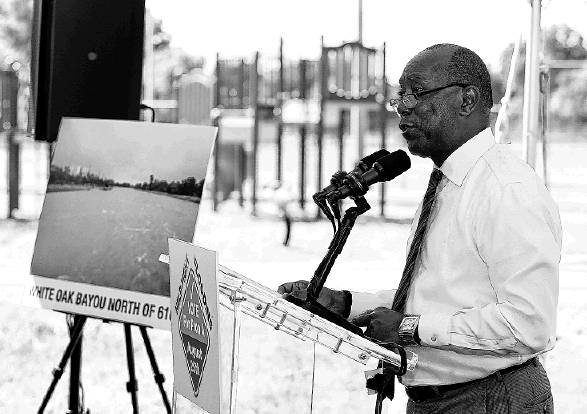A year after Harvey, residents need to help themselves by voting
ERICA GRIEDER Commentary
It’s been nearly a year since Hurricane Harvey paid its regards to Southeast Texas, and Harris County voters have a chance to commemorate the occasion by approving a $2.5 billion flood bond proposal.
The special election will be held Aug. 25, the anniversary of Harvey making landfall. Early voting is already underway — and turnout, thus far, has been low. As of Tuesday, just
50,000 votes had been cast.
That’s not shocking. It’s a special election, in August, and Proposition A is the only item on the ballot. The measure is expected to pass, with or without your vote. A survey from the Hobby School of Public Affairs at the University of Houston earlier this month found that 55 percent of respondents approve of the proposal.
Just 35 percent were undecided — and I don’t see any reason to think Harris County voters will sour on the concept of flood prevention and mitigation this month in light of what happened last year.
Before Harvey coalesced over the Caribbean, Texans knew a few things about severe weather. It’s always been true that the Gulf Coast occasionally gets walloped by hurricanes. And most Texans know that meteorologists expect such storms to become more frequent and severe in the future, as the risks presented by geography are exacerbated by climate change.
Because Houston is a low-lying city, criss-crossed with swaths of cement, sprawled over a number of flood plains, we also know that Harris County is prone to flooding in heavy rain events.
Last summer, after Harvey turned toward the Texas coast, I felt a strange mixture of anxiety and relief. The region, which includes America’s fourth-largest city, had about 48 hours to prepare for a terrifying storm. The millions of people in its direct path couldn’t count on any outside help. The nation, as a whole, was distracted by Donald Trump, who had provoked a debate over whether neo-Nazis might be “very fine people.” And state leaders were, for the most part, nowhere to be found.
On the other hand, it was reassuring as Harvey barreled toward the coast to know that the major American city under threat was, as it happens, the city most comfortable in MacGyver mode. Houston is oddly well-equipped to deal with a crisis with improvisation, and on its own. It’s done so before, for example, after Hurricane Ike when the rest of the country was focused on the financial crisis and Sarah Palin possibly being the nation’s next vice president.
No tap on rainy day
Most Americans, as a result, probably don’t realize how destructive Harvey was. It was one of the costliest storms in U.S. history but far from the deadliest. The damage was diffused over a vast area of Texas. And state leaders haven’t tapped into the state’s more than $11 billion rainy day fund to help with the recovery effort. That has, perhaps, given national observers the impression that Houston doesn’t need the help.
But the fact is that Harvey was an incredibly destructive storm. The region, including Harris County, is still at the beginning of a recovery process that will take years, if not decades, and which could easily be jeopardized by subsequent storms.
And the reason that state leaders haven’t tapped the rainy day fund is that they literally can’t. The Legislature wasn’t in session when Harvey made landfall. Its next regular session begins in January 2019. Gov. Greg Abbott could, in the meantime, call a special session dedicated to Harvey relief.
However, it’s been a year since Harvey, and Abbott evidently doesn’t want a special session. That’s why local leaders have called for Harris County to issue $2.5 billion in flood bonds.
Nudging leaders to act
Even if approved, the funds wouldn’t be sufficient to pay for all the flood prevention and mitigation projects local leaders have called for to ensure that Houston has a viable future. The money would pay for some projects — and enable Harris County to access federal funds for others. So Proposition A isn’t a Band-Aid, it’s a start.
Although the state obviously has a role to play in the region’s recovery, there’s no guarantee that leaders like Abbott will act accordingly, if re-elected. But I think they are more likely to treat flood mitigation and prevention as a priority if Proposition A passes. The arguments in favor of its passage are straightforward — so straightforward, in fact, that I wasn’t sure whether I should even write a column about it.
“The flood bonds are about the future of this city,” said a colleague, when I asked if he thought it would be a good topic.
“If we don’t do it, Harris County will get shellacked, again, and we’ll deserve it. This is the minimum we can do,” he continued, in a state of slight agitation.
He corrected himself: “This isn’t even the minimum. But it is something we can do.”
That’s correct, of course. And if there’s something you can do, in response to a disaster like Harvey, you should — whether you’re a statewide elected official or a Houstonian with a kayak whose neighbors need help.
The Aug. 25 special election offers Harris County voters an opportunity to remind Abbott of that. And I’d encourage everyone to take it, whether via early voting — which ends Tuesday, Aug. 21 — or on the anniversary of Harvey making landfall and of Texans rising to the occasion. erica.grieder@chron.com
It was reassuring as Harvey barreled toward the coast to know that the major American city under threat was, as it happens, the city most comfortable in MacGyver mode.

